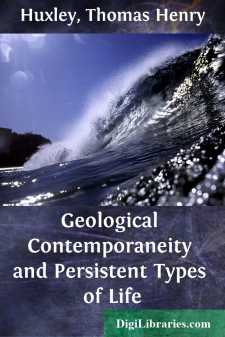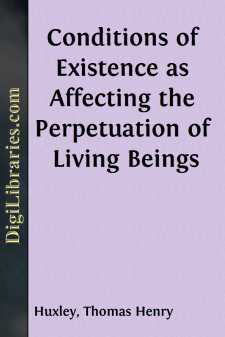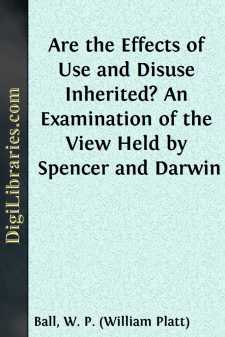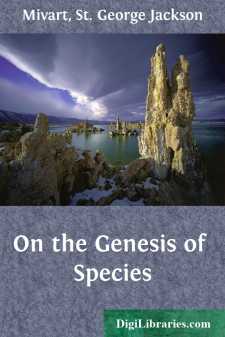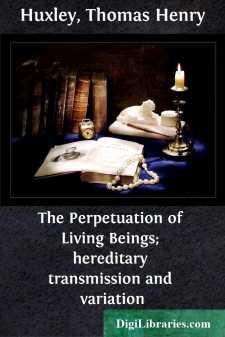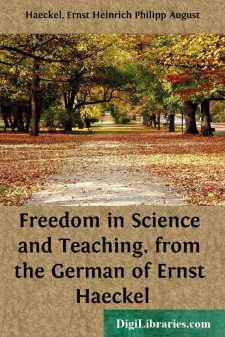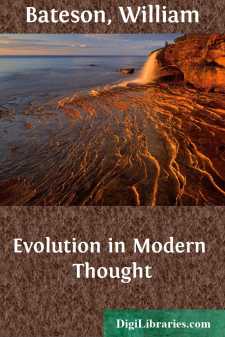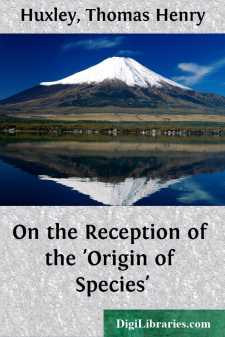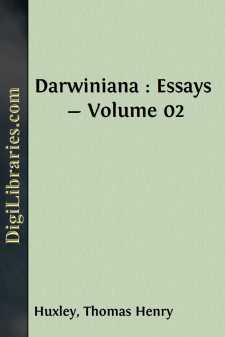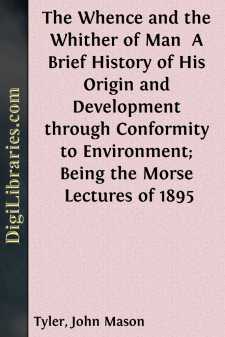Science
- Astronomy 18
- Biology
- Chemistry 13
- Electricity 1
- General 38
- History 6
- Light 1
- Paleontology 2
- Philosophy & Social Aspects 1
- Physics 3
- Relativity 2
- Study & Teaching 1
- Waves & Wave Mechanics 1
Biology Books
Sort by:
MERCHANTS occasionally go through a wholesome, though troublesome and not always satisfactory, process which they term "taking stock." After all the excitement of speculation, the pleasure of gain, and the pain of loss, the trader makes up his mind to face facts and to learn the exact quantity and quality of his solid and reliable possessions. The man of science does well sometimes to imitate...
more...
IN the last Lecture I endeavoured to prove to you that, while, as a general rule, organic beings tend to reproduce their kind, there is in them, also, a constantly recurring tendency to vary—to vary to a greater or to a less extent. Such a variety, I pointed out to you, might arise from causes which we do not understand; we therefore called it spontaneous; and it might come into existence as a...
more...
PREFACE. My warmest thanks are due to Mr. Francis Darwin, to Mr. E. B. Poulton (whose interest in the subject here discussed is shown by his share in the translation of Weismann's Essays on Heredity), and to Professor Romanes, for the help afforded by their kindly suggestions and criticisms, and for the advice and recommendation under which this essay is now published. Encouragement from Mr....
more...
INTRODUCTORY. The problem of the genesis of species stated.—Nature of its probable solution.—Importance of the question.—Position here defended.—Statement of the Darwinian Theory.—Its applicability to details of geographical distribution; to rudimentary structures; to homology; to mimicry, &c.—Consequent utility of the theory.—Its wide acceptance.—Reasons for this, other than, and...
more...
The inquiry which we undertook, at our last meeting, into the state of our knowledge of the causes of the phenomena of organic nature,—of the past and of the present,—resolved itself into two subsidiary inquiries: the first was, whether we know anything, either historically or experimentally, of the mode of origin of living beings; the second subsidiary inquiry was, whether, granting the origin, we...
more...
PREFATORY NOTE. In complying with the wish of the publishers of Professor Haeckel's reply to Professor Virchow, that I should furnish a prefatory note expressing my own opinion in respect of the subject-matter of the controversy, Gay's homely lines, prophetic of the fate of those "who in quarrels interpose," emerge from some brain-cupboard in which they have been hidden since my...
more...
by:
William Bateson
In seeking to discover Darwin's relation to his predecessors it is useful to distinguish the various services which he rendered to the theory of organic evolution. (I) As everyone knows, the general idea of the Doctrine of Descent is that the plants and animals of the present day are the lineal descendants of ancestors on the whole somewhat simpler, that these again are descended from yet simpler...
more...
ON THE RECEPTION OF THE 'ORIGIN OF SPECIES.' To the present generation, that is to say, the people a few years on the hither and thither side of thirty, the name of Charles Darwin stands alongside of those of Isaac Newton and Michael Faraday; and, like them, calls up the grand ideal of a searcher after truth and interpreter of Nature. They think of him who bore it as a rare combination of...
more...
THE DARWINIAN HYPOTHESIS [1859] The hypothesis of which the present work of Mr. Darwin is but the preliminary outline, may be stated in his own language as follows:— "Species originated by means of natural selection, or through the preservation of the favoured races in the struggle for life." To render this thesis intelligible, it is necessary to interpret its terms. In the first place, what...
more...
by:
John Mason Tyler
CHAPTER I THE PROBLEM: THE MODE OF ITS SOLUTION The story of a human life can be told in very few words. A youth of golden dreams and visions; a few years of struggle or of neglected opportunities; then retrospect and the end."We come like water, and like wind we go." But how few of the visions are realized. Faust sums up the whole of life in the twice-repeated word versagen, renounce, and...
more...


